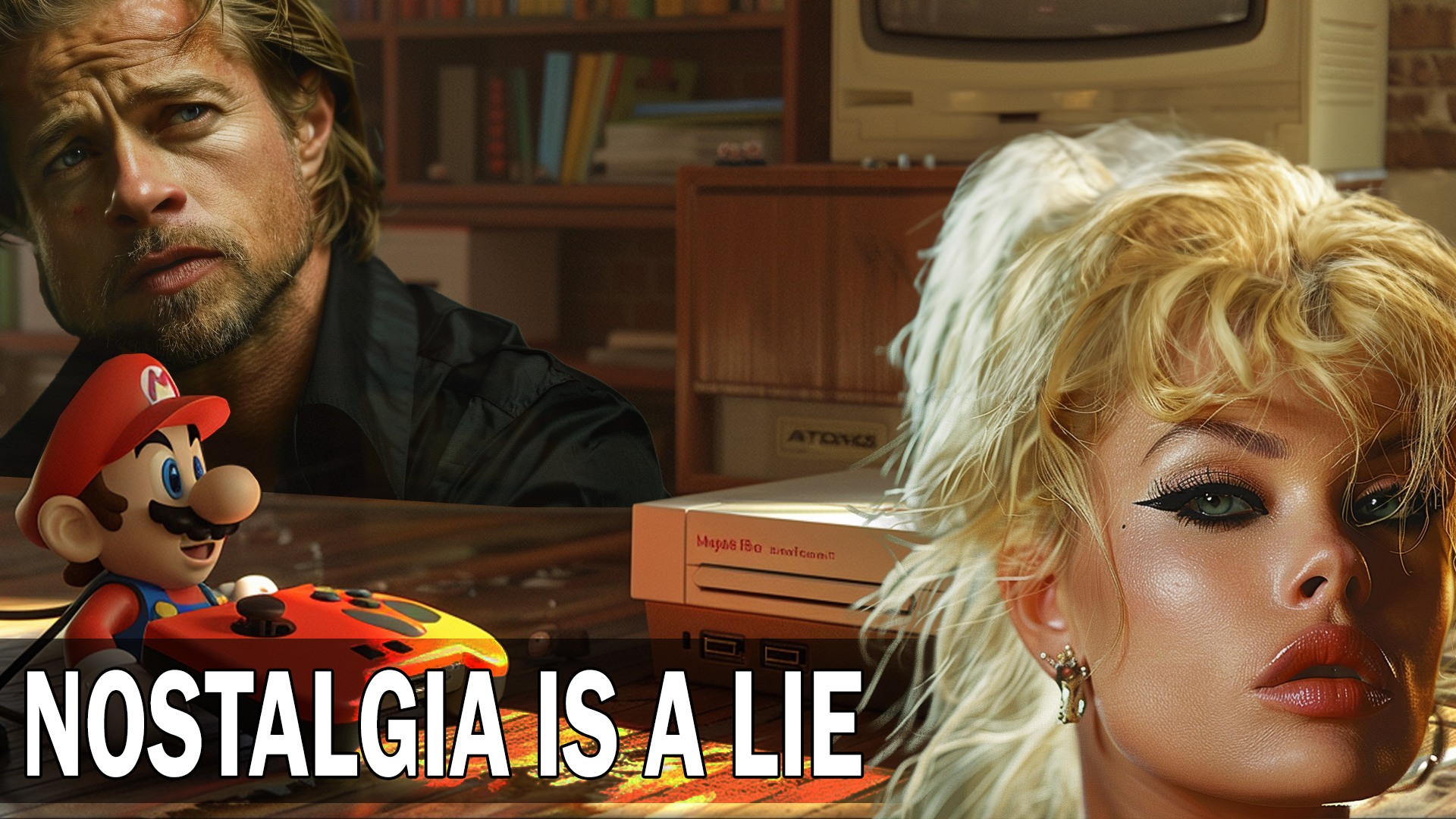Have you ever found yourself lost in a daydream about "the good old days"? Nostalgia, that warm, fuzzy feeling that engulfs us when we hear a familiar old song or stumble upon a childhood photograph, seems to transport us back to a time when things were supposedly better, simpler, and happier. But is this rosy view of the past accurate, or are we just falling for a beautifully constructed lie?
In this post, we’ll peel back the layers of nostalgia to uncover how it colors our memories more brightly than reality truly warrants. We'll explore the psychological tricks our minds play on us, and why understanding this can profoundly impact our current happiness and future decisions.
By the end, you’ll not only see your past in a more realistic light but also learn how to harness nostalgia effectively to enrich your present and future.
The Allure of Nostalgia
The Emotional Appeal
Imagine sitting in a cozy room as rain patters gently against the window. You're flipping through an old photo album, each picture a gateway to another time. That’s the essence of nostalgia. It's not just a memory; it's an emotional blanket, warming us with images of sunlit picnics, laughter-filled family gatherings, and carefree youthful adventures. These memories, whether they capture moments from last summer or from distant childhood days, offer a comforting escape from today's fast-paced world.
Memory and Selectivity
Our minds hold the incredible power to edit our past. Like a skilled filmmaker, our brain can produce a version of our life story that highlights triumphs and happy moments while downplaying or even omitting the times of struggle or boredom. This isn't deceitful; it’s a natural part of how memory works. It helps us cope with regrets and maintain a sense of inner harmony.
The Deceptive Nature of Nostalgia
Rose-Colored Glasses
Nostalgia has a subtle but profound power to color our view of the past in hues more vivid and cheerful than the reality. This phenomenon is like viewing an old movie where the scenes are selectively brightened—sunshine is always perfect, smiles are always genuine, and the air seems clearer. This romanticized version of the past can be comforting, yet it distorts our true history, smoothing over the rough patches that were certainly part of the experience.
Real Examples from Daily Life
Nostalgia doesn’t just color our past—it also seeps into our everyday decisions and feelings about our current life. This can manifest in simple ways, like believing that the snacks from our childhood were tastier, or in more significant aspects, such as idealizing past relationships or old jobs. These distorted views can lead to dissatisfaction with the present, as we yearn for a time that seems simpler or more joyful compared to the complexities we face today.
The Impact of Nostalgia on Perception
Comparison with the Present
Nostalgia often serves as a refuge, especially when our current circumstances feel overwhelming or unsatisfactory. It’s like looking back through a photo album where only the best moments are on display, making the present seem dull in comparison. This idealization of the past can be comforting, yet it risks distorting our view of both then and now. It leads us to believe that life used to be simpler, easier, or more fulfilling, which might not be the whole truth.
The Risk of Over-Romanticizing
The danger of over-romanticizing the past lies in how it skews our perception of reality. By enhancing the positive and downplaying the negative, nostalgia can make us nostalgic for a time that never truly existed. This distorted nostalgia can lead us to make decisions that are out of step with our actual needs and current opportunities.

The Benefits of Nostalgia
Emotional Benefits
Despite its potential to distort, nostalgia is not without its charms and benefits. At its heart, nostalgia is a source of great comfort and emotional warmth. Like a favorite old sweater, it can envelop us in feelings of security and happiness when we recall times of joy and connection. This emotional boost is particularly valuable in times of stress or loneliness, serving as a reminder that happiness was once ours and can be again.
Social Benefits
Nostalgia also plays a crucial role in strengthening social bonds. Sharing nostalgic memories can bring people closer, creating a shared emotional landscape that spans different times and places. When we recount tales from the past with family or friends, we rekindle old connections and forge new ones. These shared stories act like glue, bonding us over shared experiences and common histories.
Motivational Benefits
Furthermore, nostalgia can serve as a motivational force, reminding us of past accomplishments and the hurdles we've overcome. Remembering how we navigated past challenges or achieved goals can reignite our confidence and drive. It’s like looking at a collection of personal victories that remind us of our capabilities and potential.
Harnessing Nostalgia Wisely
Balancing Perspective
While nostalgia can sweeten our memories of the past, it's crucial to approach these feelings with a balanced perspective. This means recognizing the allure of nostalgia without letting it cloud our understanding of reality. It's similar to enjoying a beautifully directed film while acknowledging the creative liberties taken to enhance the story. By appreciating nostalgia for what it is—a selective recall of the past—we can enjoy its emotional benefits without being misled by its distortions.
Learning from the Past
Nostalgia can be more than just a retreat into comforting memories; it can also be a tool for personal growth. By revisiting our past—both the good and the bad—we can learn valuable lessons about ourselves and how we handle life's challenges. Reflecting on how we dealt with past hardships gives us clues on how to manage current issues more effectively.
Creative Inspiration
Moreover, nostalgia can be a potent source of creativity. It can inspire us to reconnect with past passions and explore old interests with new perspectives. Whether it's an old hobby that brought you joy or a forgotten dream, nostalgia can reignite that spark and motivate you to pursue those interests again.
Nostalgia as a Tool for Self-Discovery
Building a Stronger Self
Nostalgia is not just about revisiting the past; it's about constructing a deeper, more meaningful understanding of ourselves. Each memory, whether joyful or challenging, serves as a building block in our personal narrative. By reflecting on these memories, we gain insights into our character and values, which in turn shapes our sense of self.
Navigating Life Using Nostalgia
Using nostalgia consciously allows us to navigate life more effectively by applying lessons learned from the past to current situations. It acts as a compass, guiding us through life's challenges using the wisdom we've gained from our experiences. For instance, thinking back to a time when you successfully navigated a personal conflict can provide valuable strategies for managing current relationships or professional challenges.
Nostalgia, often seen as a mere sentimental longing for the past, reveals itself to be a multifaceted emotion with profound impacts on our lives. While it can distort our perception of bygone days, painting them in overly bright colors, it also holds the potential to comfort, connect, and inspire us. Understanding the dual nature of nostalgia allows us to engage with it more deeply and meaningfully, appreciating the warmth it brings while staying alert to its illusions.
By balancing our view of the past with a critical eye and an open heart, we can enjoy the best of what nostalgia offers without being misled by its selective memory. This balanced approach helps us to cherish our memories and use them as tools for personal growth and creativity. As we navigate the complexities of life, nostalgia can serve not only as a refuge but as a rich source of insight and inspiration, helping us to build a present and future as rewarding as the past we remember.
If this exploration of nostalgia has resonated with you, consider how you can apply these insights to your own life. Start by revisiting your memories, not just to relive them, but to learn from them and find new ways to enrich your current experiences. Share your stories with friends and family, and see how these shared memories strengthen your bonds and enhance your sense of community.
Remember, while nostalgia might color our view of the past, it can also illuminate our path to a more fulfilling life.
